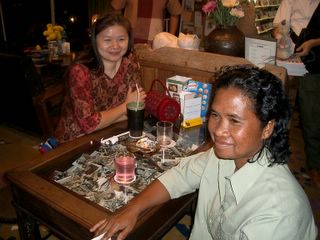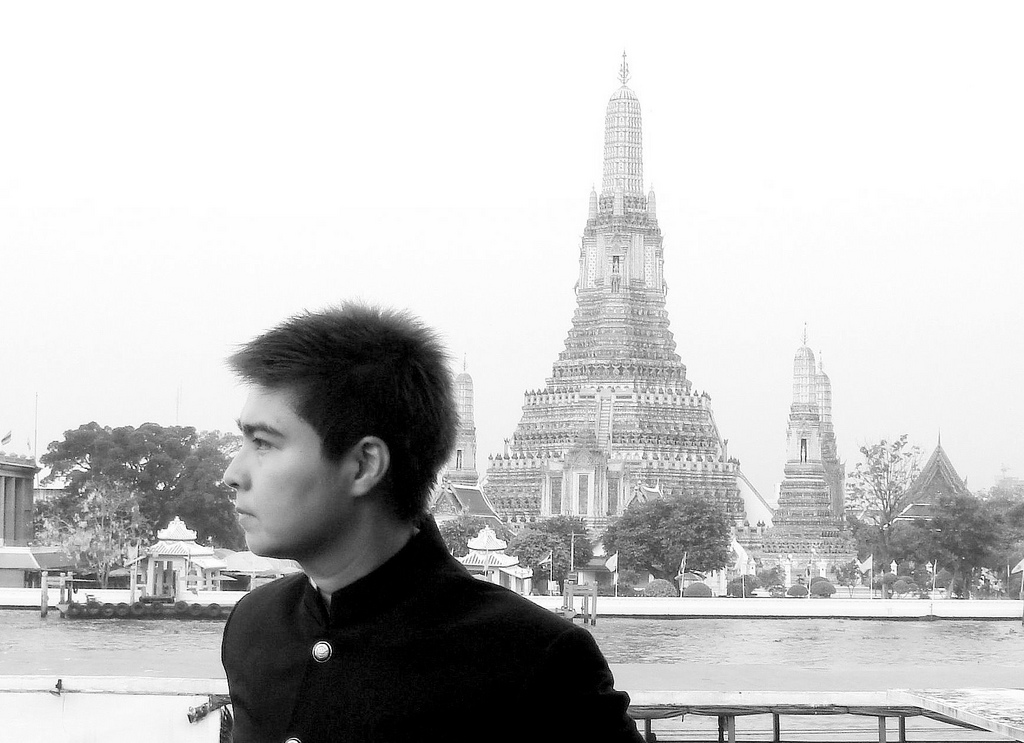
Story by ATIYA ACHAKULWISUT Photo by SMITH SUTIBUT
Popular writer and monk Phra Maha Wudhijaya Vajiramedhi believes that the Sangha must employ modern means to promote dharma to reach members of the new generation.
Best-selling monk Phra Maha Wudhijaya Vajiramedhi is using modern means to promote and popularise the age-old teachings of the Lord Buddha
He considers himself the Boyd Kosiyapong of the clerical community. As a songwriter and musician, Boyd produces popular tunes with such wide ranging appeal that they please both grandmothers and grandsons. It is in that particular respect that best-selling monk Phra Maha Wudhijaya Vajiramedhi, who writes under the pen name W. Vajiramedhi, warrants comparison. His work, which appears in the form of books, magazine articles, TV dramas and dharma songs, is read, listened to or viewed by people from five to 90 years old, from members of non-governmental organisations to the prime minister.
"I write 10 columns for magazines and newspapers at present," noted Phra Maha Wudhijaya, 32, as he sat down behind a low table in the upstairs reception area of his kuti at Wat Benchamabopitr. On it sat a large and thick appointment book.
"I have started to accept invitations for lecture and dharma talks for a couple of years," the monk said. He shook a glass full of uniformly brown-coloured, sharpened pencils. "Someone gave them to me," he indicated. "I actually write with a computer notebook."
One of the most prolific monks around, Phra Maha Wudhijaya has written more than 20 books. One of them, Dharma Tid Peek (Words of Wisdom), was made into a TV programme for children. It was so popular that a second season is being made. The series also won the Golden TV award as an outstanding drama for social development.
The range of publications that the monk contributes to is indicative of his breadth and popularity. It includes almost anything from hard-news newspapers like Matichon to cooking magazine Health & Cuisine, relationship titles such as Love and Share, strictly dharma and amulet publications like Thong Dharma (Flag of Dharma) and Saksith (Sacred), as well as the practical guide Kae Jon (Stopping Poverty).
A studious monk who reads three newspapers a day and has more than 5,000 books in his possession, Phra Maha Wudhijaya started writing because he wanted to popularise Buddhist teachings as a practical tool to solve problems in everyday life.
"In terms of canon, we have some of the best written by the likes of P.A. Payutto or the late Buddhadasa. It is applied dharma for a majority of people _ members of the middle class or the young generations _ that we still lack," he said.

One of his books, Tai Laew Kerd Mai Tam Nai Buddhasasana (Rebirth in the Buddhist Context), caught the eyes of Amarin Publishing's top executive Metta Utakapan. She invited him to write for the company's magazines and later published a series of dharma-made-easy books including Dharma Lab Sabai (now available in English under the title of Anger Management), Dharma Dub Ron (The Recipes for Success) and Dharma Bandan (The Inspiration) among others.
Phra Maha Wudhijaya cites his love of reading and learning _ not only of religious matters but of social and current affairs _ as the resources for his work. "I don't shut myself in the temple. I try to expose myself to society and to things that are happening in people's lives. I travel," the monk said, adding that he started reading the Tripitaka and encyclopaedia when he was 15.
"I love learning, so much it sometimes becomes a bit of a problem. I have two secular degrees now but every time I see some new courses opening, I still feel like taking them. I have to tell myself that I must know what is enough, that it is better to know my handful of leaves well than to seek every leaf in the forest," said the monk, who holds a bachelor's degree in education from Sukhothai Thammathirat Open University, and a master's of Buddhist studies from Mahachulalongkorn.
This love of reading can be traced back to his childhood. A native of Ban Krueng Tai, Chiang Rai, Phra Maha Wudhijaya described himself as the family's bookish, compliant youngest son. He was always with his mother when she went to make merit at a local temple.
"I've liked the idea of being a monk since I was a child. It could be said it was love at first sight," he said, adding that his primary school shared the same wall with the temple and the sight of saffron robes was uplifting to him. When he finished primary school at age 14, he received ordination as a novice and continued his religious and secular studies concurrently.
"I did not feel deprived that I could not run around dancing and having fun like my friends or people of the same age. I entered the religious life because of faith, not necessity," he said. "My family is happy with it. I was by nature a studious child and I became even more learned as a novice. I memorised all the sermons. I read all the books there were at the temple's library."
At 21, he was ordained as a monk. Later, he took residence at Wat Benchamabopitr to continue his Pali studies.
"As a novice, I studied to enrich myself," he recalled. "As a monk, the aim of my study was to teach others. Also, I started to practise meditation. And I realised that the practice was indeed the core of monkhood."
He added that meditation makes him realise that there is a certain kind of joy beyond senses, a fine sense of happiness which not many people know exists.
"As a novice, I was not that different from lay teenagers. I sometimes listened to music and songs from a small radio that I had. Once I learned meditation and had a chance to stay alone and practise in the forest, I stopped enjoying it. I gave the radio away and I have practised meditation ever since," the monk said.
With demands from the outside increasing, both for his writing and his lectures, how does he juggle between the needs to promote dharma and to continue his own education?
"Meditation is not just about sitting still with your eyes closed," the monk remarked. "You can do it while going about your everyday life, doing chores. I train myself to concentrate when I write my columns _ I only write one draft. I practise self-awareness when I take a bath, do cleaning or walk along the road to receive alms in the morning."
Phra Maha Wudhijaya emphasised that while he certainly sets aside time to do "proper" sitting-down-with-closed-eyes meditation, many times work and life could be blended into a whole act of cultivating mindfulness and wisdom.
With news about the misdeeds of monks and conflicts in the clergy's hierarchical administration hitting the headlines frequently, Phra Maha Wudhijaya believes that the Sangha has no choice but to strengthen its knowledge of the Buddha's dharma and to engage more with society.
"The Sangha can no longer wait for people to come to the wat. We have to reach out and use all modern means and media to get dharma to the people. If the Sangha fails to do that, it will eventually lose its role in contemporary society. It would become like one of those decaying old chedis in Ayutthaya _ once very sacred and important but now just a mark on the road for people to make a U-turn," he said.
As a monk, Phra Maha Wudhijaya views financial interests, fame and sexual desires as the three top challenges that each must face. He is well aware that one of them _ popularity _ has been knocking on his kuti door.
"Fame is like the wind. It can make us feel fresh but we can't really hold onto it. What I can do is to divert the popularity to benefit other useful causes," he said.
On financial interest, the monk said that he used all the royalties he received from his books and columns to build a library at his hometown wat.
He acknowledged that among the three defilements, desire is perhaps the most formidable.
"There were 40 monks who were ordained at the same time with me. They have long quit the monkhood and have family. I'm the only one from the batch that remains."
The young monk said that in his case it was helpful that he'd had a chance to gradually study and train himself all along from being a novice to a monk.
"I have had some sort of immunity from the training. The rest is about common sense and ethics. If we know who we are and what status we are in, we'll behave accordingly and then we'll be safe," said Phra Maha Wudhijaya, who has been in the monkhood for 19 years.
The monk's next project is to produce books about Buddhism for children.
"I would like to write a book like The Little Prince but with Buddhist concepts. Perhaps The Little Buddha," he said.
"Children are seedlings for the future. We have to give them good fertiliser."












